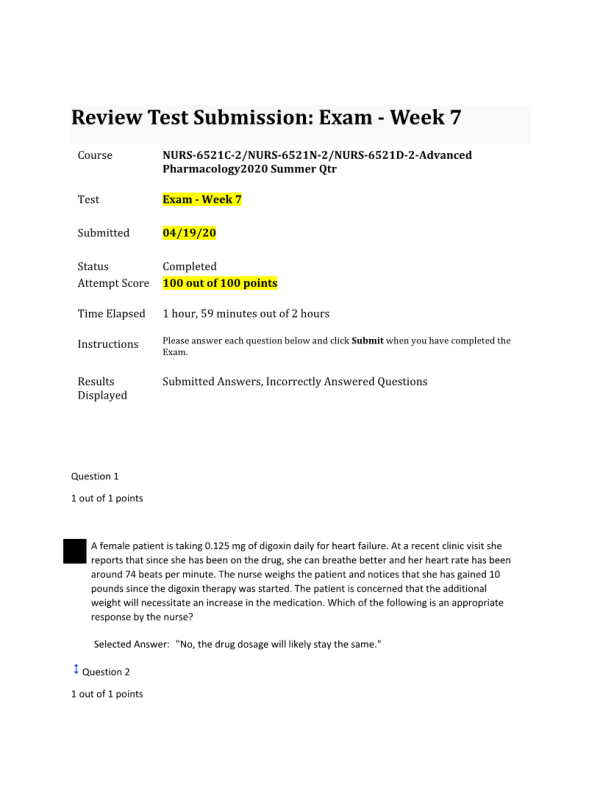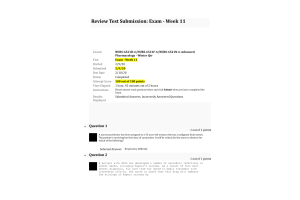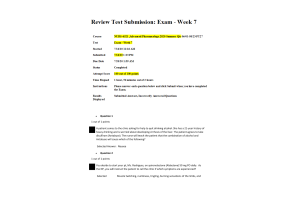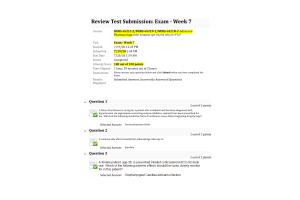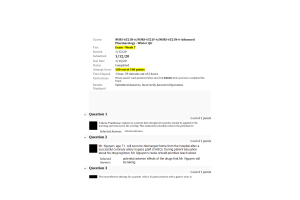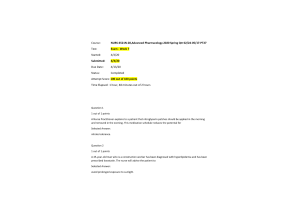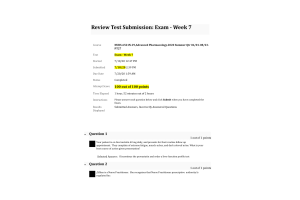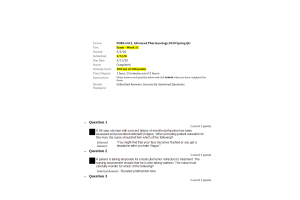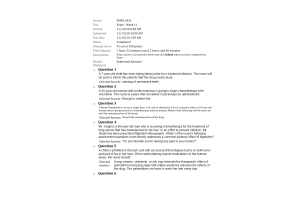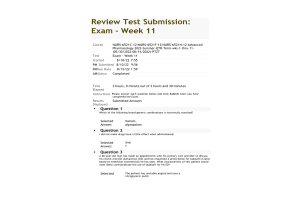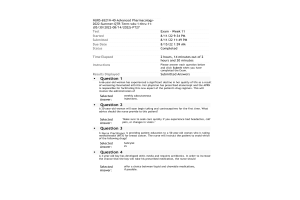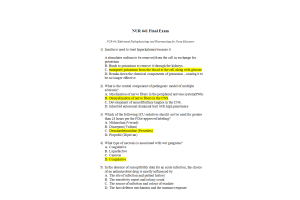NURS 6521C-2 NURS-6521N-2, NURS-6521D-2 Exam - Week 7 Midterm; 100 out of 100 Points
- $49.00
NURS 6521 Advanced Pharmacology
- Question: A female patient is taking 0.125 mg of digoxin daily for heart failure. At a recent clinic visit she reports that since she has been on the drug, she can breathe better and her heart rate has been around 74 beats per minute. The nurse weighs the patient and notices that she has gained 10 pounds since the digoxin therapy was started. The patient is concerned that the additional weight will necessitate an increase in the medication. Which of the following is an appropriate response by the nurse?
- Question: A patient with seasonal allergies is exasperated by her recent nasal congestion and has expressed her desire to treat it by using pseudoephedrine. The nurse should inform the patient that
- Question: A patient has been prescribed a histamine-2 (H2) receptor antagonist for the treatment of GERD. Why are H2RAs more effective than H1 receptor antagonists in the treatment of diseases of the upper GI tract?
- Question: Which of the following will a Nurse Practitioner inform the patient is one of the most common adverse effects of guaifenesin (Robitussin)?
- Question: Frequent episodes of exercise-related chest pain have caused a 79-year-old woman to use her prescribed nitroglycerin spray several times in recent weeks. This patient's age will have what effect on her use of nitroglycerin?
- Question: A Nurse Practitioner is teaching an older adult patient about polypharmacy. Which of the following statements best describe this term?
- Question: A 47-year-old woman has been diagnosed with open-angle glaucoma. Pilocarpine drops are prescribed. The nurse's assessment reveals that the patient has worn soft contact lenses for 15 years. The nurse will instruct the patient to
- Question: A 29-year-old female patient has been prescribed orlistat (Xenical) for morbid obesity. The nurse is providing patient education concerning the drug. An important instruction to the patient would be to
- Question: The APRN is seeing Mrs. Smith, age 77, who is here for follow up of hypertension, dyslipidemia, and depression. What should you consider during her follow-up
- Question: A female patient has been taking prednisone for her asthma for 1 month. The nurse will teach her to gradually decrease her dose of prednisone to avoid
- Question: A 24-year-old factory worker has been prescribed guaifenesin for the first time. Which of the following will be a priority assessment by the nurse before the patient's first dose?
- Question: A 73-year-old woman has scheduled an appointment with her nurse practitioner to discuss her recurrent constipation. The woman states that she experiences constipation despite the fact that she takes docusate on a daily basis and performs cleansing enemas several times weekly. How should the nurse best respond to this patient's statements?
- Question: An expected outcome for a patient who has just taken sublingual nitroglycerin should be
- Question: A Nurse Practitioner is caring for a patient who is taking digoxin and a loop diuretic. Which of the following would be most important for the Nurse Practitioner to monitor?
- Question: A Nurse Practitioner who provides care on an acute medicine unit has frequently recommended the use of nicotine replacement gum for patients who express a willingness to quit smoking during their admission or following their discharge. For which of the following patients would nicotine gum be contraindicated?
- Question: A patient has recently been prescribed a drug that treats his hypertension by blocking the sympathetic receptors in his sympathetic nervous system. This action is characteristic of
- Question: A Nurse Practitioner is caring for a 73-year-old man who is receiving drug therapy. He is beginning to exhibit signs of decline in his renal system, yet his current serum creatinine level is normal. The Nurse Practitioner will base the patient's plan of care on the understanding that there is
- Question: A Nurse Practitioner is caring for a male patient who has a diagnosis of coronary artery disease (CAD). His drug therapy includes lovastatin. Because the patient has a history of severe renal disease, the nurse will assess for which of the following?
- Question: A 56-year-old female patient has been admitted to the hospital with chronic muscle spasms and has been prescribed a new medication to treat the spasms. She has a poorly documented allergy to eggs, synthetic clothes, and perfumes. What is the priority action of the nurse to ensure that prescribed medication does not experience an allergic reaction?
- Question: Which of the following statements best defines how a chemical becomes termed a drug?
- Question: An elderly postsurgical patient has developed postoperative pneumonia in the days following abdominal surgery and is being treated with a number of medications. Which of the following medications that the nurse will administer has the slowest absorption?
- Question: A Nurse Practitioner is providing discharge planning for a 45-year-old woman who has a prescription for oral albuterol. The Nurse Practitioner will question the patient about her intake of which of the following?
- Question: A Nurse Practitioner is providing a patient with a list of drugs as a part of the patient's plan of care. Which of the following drug nomenclatures should the Nurse Practitioner use to list the drugs?
- Question: A 79-year-old woman who takes several medications for a variety of chronic health problems has been prescribed an oral antiplatelet aggregator that is to be taken once daily. The nurse has encouraged the woman to take the pill at the same time of day that she takes some of her other medications. What is the most likely rationale for the nurse's advice?
- Question: A teenage boy has undergone a diagnostic workup following several months of persistent, bloody diarrhea that appears to lack an infectious etiology. The boy has also experienced intermittent abdominal pain and has lost almost 15 pounds this year. Which of the following medications is most likely to treat this boy's diagnosis?
- Question: An unconscious patient has been brought to the hospital, and the Nurse Practitioner has prescribed a life-saving drug to be administered parenterally. Which of the following methods would be the most appropriate for the nurse to use when administering the medication?
- Question: A 53-year-old man has been treated for severe asthma for several years with prednisone. Recently, his physician initiated alternate-day therapy for him. The patient tells the nurse that he would rather take the medication every day to prevent confusion. Which of the following would be the best response by the nurse?
- Question: A patient receives 25 units of NPH insulin at 7.AM. At what time of day should the nurse advise the patient to be most alert for a potential hypoglycemic reaction?
- Question: A 62-year-old man has been prescribed lovastatin. The Nurse Practitioner will instruct the patient to take the medication
- Question: A female patient has been taking zafirlukast for a week and is experiencing diarrhea. The nurse should instruct her to do which of the following?
- Question: The lower respiratory system utilizes a number of different mechanisms that confer protection and maintain homeostasis. Which of the following physiological processes protects the lower respiratory system?
- Question: The parents of a 7-year-old boy who has just been diagnosed with allergic asthma are being taught about their son's medication regimen by the nurse. The nurse is currently teaching the parent's about the appropriate use of a "rescue drug" for acute exacerbations of their son's asthma. What drug should the nurse suggests the parents to use in these situations?
- Question: A 62-year-old man is admitted to the hospital with a diagnosis of chest pain. He has an order for 0.3 mg of sublingual nitroglycerin prn for chest pain. Which of the following actions should the nurse do first when he complains of chest pain?
- Question: A patient is in the clinic for seasonal allergic rhinitis. Loratadine (Claritin) is prescribed. Which of the following statements will the nurse include when providing patient education concerning this drug?
- Question: John is a newly diagnosed diabetic that contacts the office with complaints of severe nausea and vomiting. What instructions should the APRN provide related to his insulin doses?
- Question: A patient is taking cholestyramine. The Nurse Practitioner will assess for which of the following common adverse effects of the drug?
- Question: A patient in need of myocardial infarction prophylaxis has been prescribed sulfinpyrazone for gout. Which of the following will the nurse monitor the patient most closely for?
- Question: A 46-year-old white American has been prescribed a drug that binds to acid glycoproteins. The nurse understands that white Americans usually receive
- Question: A nurse practitioner understands when prescribing a medication that there are certain questions to address. Check all that apply.
- Question: Advanced practice nurse prescribing of scheduled medications is affected most by:
- Question: A Nurse Practitioner is administering drugs to a 70-year-old patient who has a reduced plasma albumin level. When assessing the patient for therapeutic outcomes of drug therapy, the Nurse Practitioner will also be careful to observe for
- Question: A male patient is to begin treatment for pneumonia with an albuterol (Ventolin) inhaler. The nurse will advise the patient that he will most likely experience which of the following common adverse effects of the drug?
- Question: The APRN would use what class of medication to manage COPD?
- Question: It is determined that a patient, who is in a hepatic coma, needs a laxative. Lactulose is prescribed. Which of the following should the nurse monitor to assess the efficacy of the lactulose therapy?
- Question: Which of the following patients is most likely to benefit from the administration of an adrenergic agonist?
- Question: A 20-year-old woman calls the clinic at 5 PM and reports to the Nurse Practitioner that she forgot to take her morning dose of fexofenadine (Allegra). She usually takes her evening dose at 8 PM. She wants to know what she should do. The Nurse Practitioner will instruct her to
- Question: A 62-year-old woman has been prescribed a fentanyl transdermal patch for chronic cancer pain. The patient asks the nurse how long it will take for her to experience pain relief. The nurse will instruct the patient that she should feel pain relief in approximately
- Question: A Nurse Practitioner is overseeing the care of a young man whose ulcerative colitis is being treated with oral prednisone. Which of the following actions should the Nurse Practitioner take in order to minimize the potential for adverse drug effects and risks associated with prednisone treatment?
- Question: Following an endoscopy, a 66-year-old man has been diagnosed with a duodenal ulcer resulting from Helicobacter pylori infection. Which of the following medications will likely be used in an attempt to eradicate the patient's H. pylori infection? (Select all that apply.)
- Question: A Nurse Practitioner is providing patient education to a 35-year-old man who has been prescribed clonidine (Catapres) as part of step 2 antihypertensive therapy. The Nurse Practitioner should anticipate that the drug will be administered
- Question: A patient with type 1 diabetes has been admitted to the hospital for orthopedic surgery and the care team anticipates some disruptions to the patient's blood glucose levels in the days following surgery. Which of the following insulin regimens is most likely to achieve adequate glycemic control?
- Question: The Nurse Practitioner's assessment of a community-dwelling adult suggests that the client may have drug allergies that have not been previously documented. What statement by the client would confirm this?
- Question: A Nurse Practitioner receives an order to administer a critically ill patient two drugs immediately (stat). The Nurse Practitioner begins the process by
- Question: A Nurse Practitioner is instructing a patient concerning a newly prescribed drug. Which of the following should be included to help improve patient compliance and safety?
- Question: Mr. Nguyen, age 71, will soon be discharged home from the hospital after a successful coronary artery bypass graft (CABG). During patient education about his drug regimen, Mr. Nguyen's nurse should prioritize teach about
- Question: A Nurse Practitioner has administered a medication to a patient with hypertension. The prescribed drug is supposed to decrease cardiac output. A decrease in cardiac output would most likely
- Question: A Nurse Practitioner is providing discharge instructions to a patient who will be taking fludrocortisone at home. The Nurse Practitioner will encourage the patient to eat a diet that is
- Question: The APRN is treating a patient with type 2 diabetes. The patient is on the maximum dose of metformin and glucotrol. Current weight 212 pounds. Labs from this morning indicate a fasting blood sugar of 312 and HbA1C of 9. The APRN wants to start the patient on Lantus 0.2 unit/kg. What dose and instructions should the APRN provide?
- Question: A female patient calls the clinic and reports that since she has been taking dextromethorphan (Robitussin), she has been extremely drowsy and dizzy. The nurse will question the patient about which of the following?
- Question: A Nurse Practitioner who provides care in a long-term care facility is documenting a new resident's medication regimen on the resident's intake admission. The Nurse Practitioner is documenting the generic, rather than proprietary, names of the resident's current drugs because
- Question: Federal legislation dictates a lengthy and rigorous process of testing for new drugs. What is the primary purpose of this testing process?
- Question: A Nurse Practitioner has been administering a drug to a patient intramuscularly (IM). The physician discontinued the IM dose and wrote an order for the drug to be given orally. The Nurse Practitioner notices that the oral dosage is considerably higher than the parenteral dose and understands that this due to
- Question: A 77-year-old patient has a long-standing history of hypertension, a health problem that is being treated with metoprolol and a thiazide diuretic. Before administering the 8 AM dose of these medications, what assessments should the nurse perform and document? (Select all that apply.)
- Question: A Nurse Practitioner explains to a patient that nitroglycerin patches should be applied in the morning and removed in the evening. This medication schedule reduces the potential for
- Question: A 62 year old male who had a myocardial infarction one year ago is being seen for hypertension. Which medication has the best evidence in mortality reduction?
- Question: A Nurse Practitioner is caring for a 70-year-old patient who is taking desmopressin (DDAVP). The patient has a history of cardiovascular disease. The nurse will prioritize the assessment of which of the following?
- Question: A patient is taking gabapentin (Neurontin) for spasticity associated with multiple sclerosis. Which of the following should be the priority for monitoring?
- Question: The nurse practitioner orders Amoxicillin 500 mg tid? What is the total amount of medication patient will take per day?
- Question: A patient with bronchial asthma is prescribed a sustained-release preparation of theophylline. To help minimize the adverse effects of the drug, which of the following should the nurse suggest?
- Question: The Nurse Practitioner is performing patient education for a woman who will soon begin treatment of hyperlipidemia with simvastatin (Zocor). The patient has asked the Nurse Practitioner if there are any "bad side effects" that she should be aware of. Which of the following statements should underlie the nurse's response?
- Question: Shirley, age 58, has been diabetic for 7 years. Her blood pressure for the last three office visits have been 154/100, 144/94, and 144/90. What would you prescribe today during her routine office visit?
- Question: A Nurse Practitioner is teaching a patient about his newly prescribed drug, colchicine, for gout. The Nurse Practitioner will instruct the patient to avoid which of the following foods?
- Question: A 66-year-old woman has a complex medical history that includes poorly-controlled type 1 diabetes, renal failure as a result of diabetic nephropathy and chronic heart failure (CHF). Her care provider has recently added spironolactone (Aldactone) to the woman's medication regimen. The nurse should consequently assess for signs and symptoms of
- Question: A patient has been prescribed rabeprazole (Aciphex). It will be important for the nurse to assess the patient's drug history to determine if the patient is taking which of the following drugs?
- Question: A 55-year-old man's hypertension has not responded adequately to his current medication regimen consisting or an ACE inhibitor, a beta-blocker and a thiazide diuretic. As a result, he will soon begin taking hydralazine (Apresoline) in addition to his existing antihypertensives. The addition of this medication to his regimen means that the nurse must prioritize which of the following nursing actions?
- Question: A clinic Nurse Practitioner has been assigned a 49-year-old female patient who has a history of diabetes. A recent diagnosis of hypertension has been made, and the patient has been prescribed a thiazide diuretic and labetalol. The patient will be scheduled to return to the clinic once a month for the next 6 months. A priority action by the Nurse Practitioner will be to
- Question: A Nurse Practitioner is conducting an assessment of a patient who has recently had several changes made to her drug regimen. What assessment question most directly addresses the safety implications of the patient's drug regimen?
- Question: A Nurse Practitioner is discussing with a patient the efficacy of a drug that his physician has suggested, and he begin taking. Efficacy of a drug means which of the following?
- Question: A Nurse Practitioner is caring for a patient who has recently moved from Vermont to south Florida. The patient has been on the same antihypertensive drug for 6 years and has had stable blood pressures and no adverse effects. Since her move, however, she reports "dizzy spells and weakness" and feels that the drug is no longer effective. The Nurse Practitioner suspects that the change in the effectiveness of the drug is related to
- Question: A 68-year-old man complains of a chronic, nonproductive cough. He states that he has to have relief, that he has been coughing every 2 to 3 minutes, and he is worn out. Dextromethorphan is prescribed for him. Before he leaves the clinic he asks how long it will take for the medicine to work. The nurse will advise him that he should experience therapeutic effects in
- Question: A physician has ordered subcutaneous injections of morphine, a narcotic, every 4 hours as needed for pain for a motor vehicle accident victim. The nurse is aware that there is a high abuse potential for this drug and that it is categorized as a
- Question: A 60-year-old man has scheduled a follow-up appointment with his primary care provider stating that the omeprazole (Prilosec) which he was recently prescribed is ineffective. The patient states, "I take it as soon as I feel heartburn coming on, but it doesn't seem to help at all." How should the nurse best respond to this patient's statement?
- Question: A 33-year-old woman has irritable bowel syndrome (IBS). The physician has prescribed simethicone (Mylicon) for her discomfort. Which of the following will the nurse monitor most closely during the patient's drug therapy?
- Question: A patient has been admitted to the ICU because of multiple traumas due to a motor vehicle accident. The physician has ordered propofol (Diprivan) to be used for maintenance of sedation. Before administration of propofol, a priority assessment by the nurse would be to check for a history of
- Question: Mrs. Houston is a 78-year-old woman who resides in an assisted living facility. Her doctor prescribed digoxin at her last visit to the clinic and she has approached the nurse who makes regular visits to the assisted-living facility about this new drug. What teaching point should the nurse emphasize to Mrs. Houston?
- Question: A Nurse Practitioner is instructing a patient who was recently diagnosed with multiple sclerosis about dantrolene (Dantrium). The patient is a 38-year-old-male and the foreman for a construction company. In order to minimize one important adverse effect of the drug, the nurse will give the patient which of the following instructions?
- Question: A 45-year-old man who is a construction worker has been diagnosed with hyperlipidemia and has been prescribed lovastatin. The nurse will advise the patient to
- Question: Decongestants are recommended to use in which of the following patients?
- Question: Mesalamine (Asacol) is prescribed for a 22-year-old woman with Crohn disease. The nurse will discuss with the patient the possibility for which of the following adverse effects related to the new drug therapy?
- Question: Several months of treatment with a statin accompanied by lifestyle modifications have failed to appreciably improve a patient's cholesterol levels. Consequently, the patient has been prescribed cholestyramine. The nurse should recognize that this drugs achieves its therapeutic effect by
- Question: Mr. Penny, age 67, was diagnosed with chronic angina several months ago and has been unable to experience adequate relief of his symptoms. As a result, his physician has prescribed ranolazine (Ranexa). Which of the following statements is true regarding the use of ranolazine for the treatment of this patient's angina?
- Question: Which statement is FALSE regarding the treatment of hyperthyroidism?
- Question: A 72-year-old man is taking Adderall XR for the treatment of narcolepsy. He is currently having problems with not being able to swallow large tablets or capsules. The man also wears dentures, which makes it even more difficult for him to swallow medication. He is in the clinic to talk to the nurse about his problem. The nurse will instruct him to
- Question: A patient has been prescribed a Scheduled 5 drug, an example of this drug is
- Question: A patient with a recent diagnosis of acute renal failure has a long-standing seizure disorder which has been successfully controlled for several years with antiseizure medications. The nurse should recognize that the patient's compromised renal function will likely
- Question: A patient comes to the clinic asking for help to quit drinking alcohol. She has a 21-year history of heavy drinking and is worried about developing cirrhosis of the liver. The patient agrees to take disulfiram (Antabuse). The nurse will teach the patient that the combination of alcohol and Antabuse will cause which of the following?
- Question: The Nurse Practitioner is prescribing Salmeterol (Serevent) inhaler for a patient with asthma. What instructions would be correct to provide the patient?
- Question: A Native American man who lives a traditional lifestyle is scheduled to have heart surgery. The tribal chief has requested that the tribe's medicine man perform a ritual before the patient goes to surgery. The nurse's response to this request should be
- Question: A patient has been prescribed a drug that can be self-administered at home. Which of the following would be the most important information for the nurse to relate to the patient concerning self-administration of a drug?
- Question: A 79-year-old patient in a long-term care facility is to receive an intravenous fat emulsion. Which of the following lab values would be a priority for the nurse to assess before administration?
